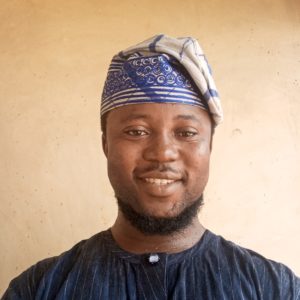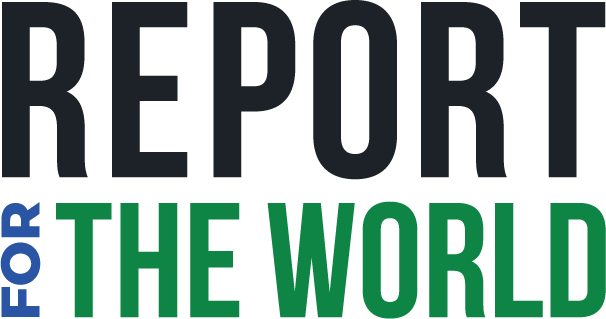Taiwo Adebulu is a fact-checker in Nigeria for TheCable through Report for the World. Don’t miss his Instagram #TakeoverTuesday as part of our December Corps Member Spotlight.
Follow Report for the World on Instagram.
The interview has been edited for length and clarity.

How did you become interested in fact-checking?
I often call myself an accidental fact-checker. While I was into development and investigative reporting, at one point, I realized that fact-checking is ingrained in all forms of journalism. In each investigation, I find there is someone churning out falsehoods or distorting facts to score a point. I began to study and read about the tenets and basics of fact-checking and learned online how to verify claims and how to use the techie tools that could help verify my findings. From there, I produced my first fact check which earned me a 2020 African Fact-Checking Award.
What are some of the challenges you face as a fact-checker in Nigeria?
One of the major challenges that I face as a fact-checker in Nigeria is the feedback my desk receives anytime we cover religious or ethnic issues. Nigeria is quite a sensitive place when it comes to these topics. So, when we produce a fact-checking report to correct a misleading and viral claim about a popular religious cleric or a secessionist figure, thousands of readers come to the comment session to question our motives for writing such an article. As another example, people don’t want you to broach the subject of the farmer-herder crisis because they feel you might be supporting one side or another. Yet, these are among the biggest issues that fuel misinformation in the country, and most of the time, when these issues are not quickly fact-checked, they lead to violence and reprisals.
I often call myself an accidental fact-checker. While I was into development and investigative reporting, at one point, I realized that fact-checking is ingrained in all forms of journalism. In each investigation, I find there is someone churning out falsehoods or distorting facts to score a point.
Reading your fact-checking stories, misinformation in Nigeria seems to spread and go viral on private messaging apps such as WhatsApp. What are the challenges of countering and tracking misinformation on a private messaging app?
We’ve done a lot of work to curb the spread of misinformation on social media by sharing stories across platforms and tagging those concerned. But it is quite hard to do on WhatsApp, where older users often send “forwarded as received” messages without verification. If a lot of these people are not in WhatsApp groups where the fact checks are shared, they won’t get informed. And really, I’ve discovered that people would rather join WhatsApp groups where misinformation and gossip is spread than one where reliable information is disseminated. It’s quite a closed platform, unlike Twitter or Facebook, where the right information more easily appears on your timeline. It’s a huge challenge that I hope we find a means to solve soon without invading people’s privacy.
What advice do you have for readers who would like to verify information they find on social media or private messaging apps?
First of all, relax and check that information again and again. Don’t consume content on face value alone. There are always clues that show that a piece of information is fake:
- Question the source of that information. Where is it coming from? Who shared it? Is the person or platform credible?
- From there, go online and do a bit of searching yourself. There is a possibility that you will find an article that addresses that information and gives the right info.
- Contact relevant bodies or organizations whose areas of expertise relate to that information. See what they have to say.
- Again, call different people who you think are really informed in that area and cross check the info they give you.
- And most importantly, always keep an open mind. Biases can lead you to believing or sharing jaundiced information.
Which research tools – digital or otherwise – have you found useful in verifying information?
To begin, your search engine skills must be top notch; if not, the information will be sitting right there in front of you and you won’t see it. Since I mostly find myself dealing with distorted images and videos, I have found solace in Google reverse image search as well as Invid, Twitter advanced search, Yandex and Wayback machine. Then, websites of global bodies and governmental agencies are a treasure trove of data and are always useful.
In June 2021, the Nigerian government cited the spread of misinformation as one of the reasons behind the ban of Twitter in the country (another reason being Twitter’s deletion of a tweet by Nigeria’s president). Has banning a social media platform helped to stymie the spread of misinformation in Nigeria? What has been the greatest impact of this Twitter ban?
The Twitter ban in Nigeria is quite an unfortunate and misguided decision by the federal government. It was a mischievous act that has nothing to do with the spread of information, but a clear vendetta to get back at the platform for deleting the president’s tweet. Twitter is not the only social media being used in the country. If you ban one, misinformation will spread on others. I also personally believe most Nigerians use WhatsApp and Facebook more than Twitter, which is perceived as elitist. Those who are on Twitter have found a way around it with VPNs, so there really is no huge difference as far as the ban is concerned. It hasn’t stopped the spread of misinformation on Twitter or any social media platform and it has not also stopped Nigerian fact-checkers from doing their work in stemming the proliferation of fake news across all platforms. What I see as the only impact so far is that people do not visit Twitter as much as they would without VPN. The stress of having to go through the VPN, the fear of cyber attacks or theft of personal information going through a third-party app may have lessened activities on Twitter. But trust me, there is still access. In fact, I think the government fears Twitter because it is easy to quickly put out information to dismiss their falsehood and that goes viral in a matter of seconds. VPNs have been the saving grace.
What have you found to be the most impactful story you have written so far as a Report for the World corps member? Why was it impactful?
My most impactful story so far as a Report for the World corps member was the investigative story I published a few months ago about corruption in Nigeria’s public service sector, which affects everyday people living with economic vulnerability here.
The report exposed how corrupt government officials at the Federal Marriage Registry in Ikoyi, Nigeria divert millions of naira [Nigerian currency] into their personal bank accounts through illegal, extortive practices. In a year, officials at the Ikoyi marriage registry in Lagos, Nigeria’s commercial capital, could pocket over N384 million (about $960,000) in illegal fees from couples who visited their facility.
After the publication of the investigation, the story sparked an outcry from the Nigerian public on social media, who shared their experiences of official bribery and extortion at the same registry. A few days after the publication of the story, the registry stopped physical registration for marriage applications, citing orders from management. As a result of the story, applicants now register for marriage certificates on the portal from the comfort of their homes, pay government-approved fees and avoid in-person interaction with the registry officials.
*Editor’s Note: A previous version of this story stated that Taiwo Adebulu covers criminal justice. Adebulu is a fact-checker, investigating a broad range of issues.

